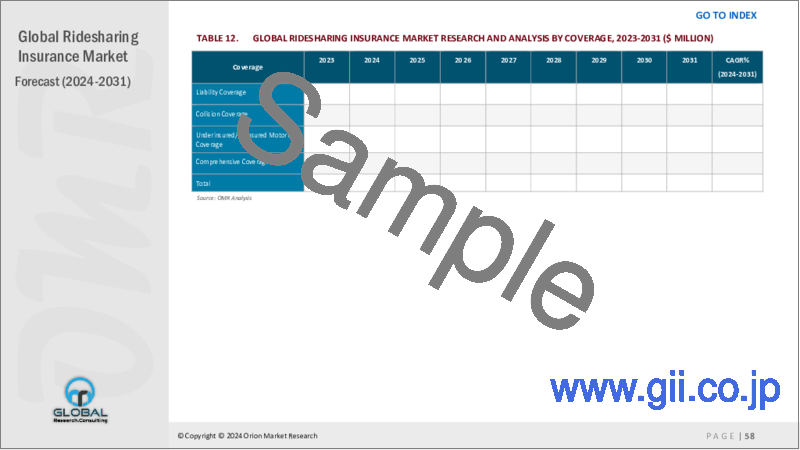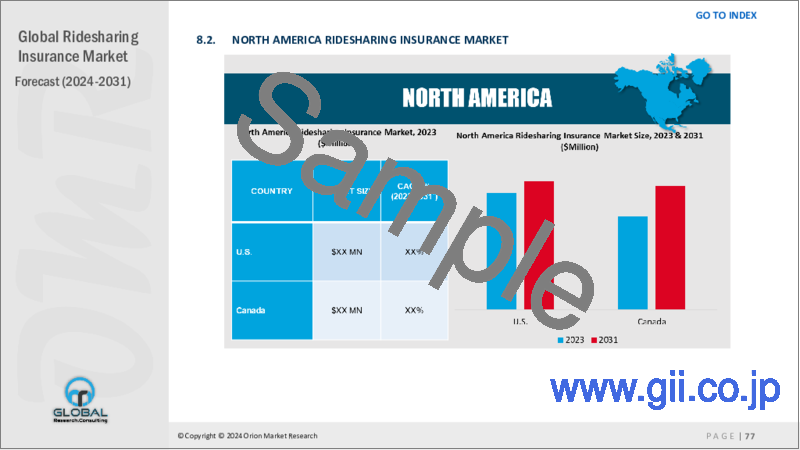|
|
市場調査レポート
商品コード
1296925
ライドシェア保険の世界市場2023-2030Global Ridesharing Insurance Market 2023-2030 |
||||||
カスタマイズ可能
|
|||||||
| ライドシェア保険の世界市場2023-2030 |
|
出版日: 2023年05月28日
発行: Orion Market Research
ページ情報: 英文 140 Pages
納期: 2~3営業日
|
- 全表示
- 概要
- 図表
- 目次
世界のライドシェア保険市場は、予測期間中にCAGR 11.1%で成長すると予測されています。ライドシェア保険は、自動車、乗員、事故に巻き込まれたその他の個人や財産を保護する一種の追加補償です。このライドシェア保険は、個人の自動車保険契約とライドシェア会社(輸送ネットワーク会社、TNCとも呼ばれる)の事業保険契約との間のギャップを埋めることができます。
ライドシェアの需要が高まり、 ドライバーはライドシェア会社に就職するため、保険会社はこうした ドライバーや乗客を保護するための専門的な補償を提供する必要性を認識しています。現在、多くの保険会社が、ライドシェア会社で働くドライバーをカバーするライドシェア専用保険を提供しています。伝統的なライドシェア保険に加え、一部の保険会社は現在、車両の個人使用と商用使用の両方をカバーするハイブリッド保険を提供しています。このタイプの保険は、ライドシェアと個人使用の両方に車を使用する ドライバーにとって特に有用です。さらに、保険会社も新しいテクノロジーを活用して、ライドシェアの ドライバーに革新的な商品やサービスを提供しています。例えば、テレマティクスのデータを利用して、 ドライバーがライドシェアにどれだけ車を利用したかに応じて補償を提供する利用ベースの保険契約を提供する会社もあります。このように、こうした要因がライドシェア保険市場の成長を後押ししています。
製品発売の増加は、ライドシェア保険市場の成長を促進すると予想されます。例えば、2021年12月、自動車保険の新興企業Ride Protectが革新的なライドシェア保険の新商品を発売しました。この保険は、ライドシェアと私的利用をカバーします。その結果、消費者は車両保険に2つの保険タイプを用意する必要がなくなっています。また、申請プロセスにはuBindの技術が採用されており、ライドシェアのドライバーにとってシームレスなデジタル体験が提供されます。さらに、uBindのプラットフォームは顧客ポータルを提供し、ライドシェアやデリバリーのドライバーがログインして保険を管理したり、オンラインで保険を更新したり、他のドライバーを追加したり、書類にアクセスしたりすることができます。
セグメント別の展望
ライドシェア保険の世界市場では、商用サブセグメントが圧倒的なシェアを占めると予想されます。
予測期間中、商用サブセグメントが市場の圧倒的シェアを占めました。これは、世界中でeコマース事業やオンラインフードデリバリーサービスが増加していること、新製品が発売されたことなどに起因しています。例えば、2020年10月、Allstate Insurance Companyは、カリフォルニア州、アイオワ州、インディアナ州、カンザス州、ケンタッキー州、ミズーリ州、オハイオ州、ウェストバージニア州において、Lyftに商用自動車保険を提供することになっています。オールステート・ビジネス・インシュアランスが管理するこの保険は、 ドライバーがLyftの ドライバーアプリを起動した時点から、乗車、旅行完了まで、Lyftの旅行のサイクル全体を通じて補償を提供します。
地域別の展望
北米が世界のライドシェア保険市場で大きなシェアを占めると予測
北米は、ライドシェアサービスの人気が高まっていること、ライドシェアのドライバーに特化した保険へのニーズが高まっていること、事故件数が増加していること、さまざまな州の政府がドライバーと乗客の安全基準について厳しい規制を定めていることなどから、収益予測期間中、他の地域市場の中でも引き続き大きなシェアを占めるとみられます。加えて、より良い保険プランを開発するための製品発売の増加や先進技術の採用も、北米におけるライドシェア保険市場の成長を増大させる一助となっています。例えば、米国を拠点とするライドシェア企業Uberは2019年9月、自動車、自動車、オートバイなどのカテゴリーを問わず、旅行中の事故に備えてライダーに無料の保険を提供すると発表しました。ライダーは、事故による死亡または障害の場合、最高6,093.8ドル、入院の場合、最高2,437.5ドル(最高609.4ドルのOPD給付金を含む)の保険に加入することになります。
目次
第1章 レポート概要
- 業界の現状分析と成長ポテンシャルの展望
- 調査方法とツール
- 市場内訳
- セグメント別
- 地域別
第2章 市場概要と洞察
- 調査範囲
- アナリストの洞察と現在の市場動向
- 主な調査結果
- 推奨事項
- 結論
第3章 競合情勢
- 主要企業分析
- Allstate Insurance Co.
- 概要
- 財務分析
- SWOT分析
- 最近の動向
- NerdWallet, Inc.
- 会社概要
- 財務分析
- SWOT分析
- 最近の動向
- State Farm Mutual Automobile Insurance Co.
- 概要
- 財務分析
- SWOT分析
- 最近の動向
- 主要戦略分析
第4章 市場セグメンテーション
- 世界のライドシェア保険市場:タイプ別
- ピアツーピア・ライドシェアリング
- リアルタイム・ライドシェアリング
- ライドシェア保険の世界市場:補償内容別
- 賠償責任補償
- 衝突補償
- 無保険車/無保険車傷害保険
- 総合補償
- ライドシェア保険の世界市場:用途別
- 個人
- 商用
第5章 地域別分析
- 北米
- 米国
- カナダ
- 欧州
- 英国
- ドイツ
- イタリア
- スペイン
- フランス
- その他欧州
- アジア太平洋
- 中国
- インド
- 日本
- 韓国
- その他アジア太平洋地域
- 世界のその他の地域
第6章 企業プロファイル
- Aflac Incorporated
- Allianz
- Aviva Canada
- AXA Group
- Chubb Group
- GIE BNP Paribas Cardif
- Liberty Mutual Insurance
- MetLife Services and Solutions, LLC
- Progressive Casualty Insurance Co.
- The Hartford
- USAA
- Wawanesa Insurance
- Zurich Insurance Group Ltd.
LIST OF TABLES
- 1. GLOBAL RIDESHARING INSURANCE MARKET RESEARCH AND ANALYSIS BY TYPE, 2022-2030 ($ MILLION)
- 2. GLOBAL PEER-TO-PEER RIDESHARING INSURANCE MARKET RESEARCH AND ANALYSIS BY REGION, 2022-2030 ($ MILLION)
- 3. GLOBAL REAL-TIME RIDESHARING INSURANCE MARKET RESEARCH AND ANALYSIS BY REGION, 2022-2030 ($ MILLION)
- 4. GLOBAL RIDESHARING INSURANCE MARKET RESEARCH AND ANALYSIS BY COVERAGE, 2022-2030 ($ MILLION)
- 5. GLOBAL LIABILITY COVERAGE IN RIDESHARING INSURANCE MARKET RESEARCH AND ANALYSIS BY REGION, 2022-2030 ($ MILLION)
- 6. GLOBAL COLLISION COVERAGE IN RIDESHARING INSURANCE MARKET RESEARCH AND ANALYSIS BY REGION, 2022-2030 ($ MILLION)
- 7. GLOBAL UNDERINSURED/UNINSURED MOTORIST COVERAGE IN RIDESHARING INSURANCE MARKET RESEARCH AND ANALYSIS BY REGION, 2022-2030 ($ MILLION)
- 8. GLOBAL COMPREHENSIVE COVERAGE IN RIDESHARING INSURANCE MARKET RESEARCH AND ANALYSIS BY REGION, 2022-2030 ($ MILLION)
- 9. GLOBAL RIDESHARING INSURANCE MARKET RESEARCH AND ANALYSIS BY APPLICATION, 2022-2030 ($ MILLION)
- 10. GLOBAL PERSONAL RIDESHARING INSURANCE MARKET RESEARCH AND ANALYSIS BY REGION, 2022-2030 ($ MILLION)
- 11. GLOBAL COMMERCIAL RIDESHARING INSURANCE MARKET RESEARCH AND ANALYSIS BY REGION, 2022-2030 ($ MILLION)
- 12. GLOBAL RIDESHARING INSURANCE MARKET RESEARCH AND ANALYSIS BY REGION, 2022-2030 ($ MILLION)
- 13. NORTH AMERICAN RIDESHARING INSURANCE MARKET RESEARCH AND ANALYSIS BY COUNTRY, 2022-2030 ($ MILLION)
- 14. NORTH AMERICAN RIDESHARING INSURANCE MARKET RESEARCH AND ANALYSIS BY TYPE, 2022-2030 ($ MILLION)
- 15. NORTH AMERICAN RIDESHARING INSURANCE MARKET RESEARCH AND ANALYSIS BY COVERAGE, 2022-2030 ($ MILLION)
- 16. NORTH AMERICAN RIDESHARING INSURANCE MARKET RESEARCH AND ANALYSIS BY APPLICATION, 2022-2030 ($ MILLION)
- 17. EUROPEAN RIDESHARING INSURANCE MARKET RESEARCH AND ANALYSIS BY COUNTRY, 2022-2030 ($ MILLION)
- 18. EUROPEAN RIDESHARING INSURANCE MARKET RESEARCH AND ANALYSIS BY TYPE, 2022-2030 ($ MILLION)
- 19. EUROPEAN RIDESHARING INSURANCE MARKET RESEARCH AND ANALYSIS BY COVERAGE, 2022-2030 ($ MILLION)
- 20. EUROPEAN RIDESHARING INSURANCE MARKET RESEARCH AND ANALYSIS BY APPLICATION, 2022-2030 ($ MILLION)
- 21. ASIA-PACIFIC RIDESHARING INSURANCE MARKET RESEARCH AND ANALYSIS BY COUNTRY, 2022-2030 ($ MILLION)
- 22. ASIA-PACIFIC RIDESHARING INSURANCE MARKET RESEARCH AND ANALYSIS BY TYPE, 2022-2030 ($ MILLION)
- 23. ASIA-PACIFIC RIDESHARING INSURANCE MARKET RESEARCH AND ANALYSIS BY COVERAGE, 2022-2030 ($ MILLION)
- 24. ASIA-PACIFIC RIDESHARING INSURANCE MARKET RESEARCH AND ANALYSIS BY APPLICATION, 2022-2030 ($ MILLION)
- 25. REST OF THE WORLD RIDESHARING INSURANCE MARKET RESEARCH AND ANALYSIS BY COUNTRY, 2022-2030 ($ MILLION)
- 26. REST OF THE WORLD RIDESHARING INSURANCE MARKET RESEARCH AND ANALYSIS BY TYPE, 2022-2030 ($ MILLION)
- 27. REST OF THE WORLD RIDESHARING INSURANCE MARKET RESEARCH AND ANALYSIS BY COVERAGE, 2022-2030 ($ MILLION)
- 28. REST OF THE WORLD RIDESHARING INSURANCE MARKET RESEARCH AND ANALYSIS BY APPLICATION, 2022-2030 ($ MILLION)
LIST OF FIGURES
- 1. GLOBAL RIDESHARING INSURANCE MARKET SHARE BY TYPE, 2022 VS 2030(%)
- 2. GLOBAL PEER-TO-PEER RIDESHARING INSURANCE MARKET SHARE BY REGION, 2022 VS 2030(%)
- 3. GLOBAL REAL-TIME RIDESHARING INSURANCE MARKET SHARE BY REGION, 2022 VS 2030(%)
- 4. GLOBAL RIDESHARING INSURANCE MARKET SHARE BY COVERAGE, 2022 VS 2030(%)
- 5. GLOBAL LIABILITY COVERAGE IN RIDESHARING INSURANCE MARKET SHARE BY REGION, 2022 VS 2030(%)
- 6. GLOBAL COLLISION COVERAGE IN RIDESHARING INSURANCE MARKET SHARE BY REGION, 2022 VS 2030(%)
- 7. GLOBAL UNDERINSURED/UNINSURED MOTORIST COVERAGE IN RIDESHARING INSURANCE MARKET SHARE BY REGION, 2022 VS 2030(%)
- 8. GLOBAL COMPREHENSIVE COVERAGE IN RIDESHARING INSURANCE MARKET SHARE BY REGION, 2022 VS 2030(%)
- 9. GLOBAL RIDESHARING INSURANCE MARKET SHARE BY APPLICATION, 2022 VS 2030(%)
- 10. GLOBAL PERSONAL RIDESHARING INSURANCE MARKET SHARE BY REGION, 2022 VS 2030(%)
- 11. GLOBAL COMMERCIAL RIDESHARING INSURANCE MARKET SHARE BY REGION, 2022 VS 2030(%)
- 12. GLOBAL RIDESHARING INSURANCE MARKET SHARE BY REGION, 2022 VS 2030 (%)
- 13. US RIDESHARING INSURANCE MARKET SIZE, 2022-2030 ($ MILLION)
- 14. CANADA RIDESHARING INSURANCE MARKET SIZE, 2022-2030 ($ MILLION)
- 15. UK RIDESHARING INSURANCE MARKET SIZE, 2022-2030 ($ MILLION)
- 16. FRANCE RIDESHARING INSURANCE MARKET SIZE, 2022-2030 ($ MILLION)
- 17. GERMANY RIDESHARING INSURANCE MARKET SIZE, 2022-2030 ($ MILLION)
- 18. ITALY RIDESHARING INSURANCE MARKET SIZE, 2022-2030 ($ MILLION)
- 19. SPAIN RIDESHARING INSURANCE MARKET SIZE, 2022-2030 ($ MILLION)
- 20. REST OF EUROPE RIDESHARING INSURANCE MARKET SIZE, 2022-2030 ($ MILLION)
- 21. INDIA RIDESHARING INSURANCE MARKET SIZE, 2022-2030 ($ MILLION)
- 22. CHINA RIDESHARING INSURANCE MARKET SIZE, 2022-2030 ($ MILLION)
- 23. JAPAN RIDESHARING INSURANCE MARKET SIZE, 2022-2030 ($ MILLION)
- 24. SOUTH KOREA RIDESHARING INSURANCE MARKET SIZE, 2022-2030 ($ MILLION)
- 25. REST OF ASIA-PACIFIC RIDESHARING INSURANCE MARKET SIZE, 2022-2030 ($ MILLION)
- 26. REST OF THE WORLD RIDESHARING INSURANCE MARKET SIZE, 2022-2030 ($ MILLION)
Title: Global Ridesharing Insurance Market Size, Share & Trends Analysis Report by Type (Peer-to-Peer Ridesharing, and Real-Time Ridesharing), by Coverage (Liability Coverage, Collision Coverage, Underinsured/Uninsured Motorist Coverage, and Comprehensive Coverage), and by Application (Personal and Commercial) Forecast Period (2023-2030).
The global ridesharing insurance market is anticipated to grow at a CAGR of 11.1% during the forecast period. Rideshare insurance is a sort of additional coverage that protects the car, the occupants, and any other individuals or property involved in an accident. This ride-hailing insurance endorsement can fill up the gaps between a person's motor insurance policy and the business policy of a ridesharing firm (also known as a transportation network company, or TNC).
Due to the growing demand for ridesharing, drivers sign up to work for rideshare companies, insurance providers are recognizing the need to offer specialized coverage to protect these drivers and passengers. Many insurance companies now offer rideshare-specific policies that cover drivers when they are working for a rideshare company. In addition to traditional rideshare insurance policies, some insurance companies are now offering hybrid policies that provide coverage for both personal and commercial use of a vehicle. This type of policy can be especially useful for drivers who use their cars for both ridesharing and personal use. Additionally, insurance companies are also leveraging new technology to offer innovative products and services to rideshare drivers. For example, some companies are using telematics data to offer usage-based insurance policies that provide coverage based on how much a driver uses their car for ridesharing. Thus, these factors propel the growth of the rideshare insurance market.
An increase in product launches is expected to promote the rideshare insurance market growth. For instance, in December 2021, car insurance startup Ride Protect launched a new innovative rideshare insurance offering. The policy covers rideshare and private use. As a result, consumers no longer need two separate policy types for their vehicle insurance. In addition, the application process uses technology from uBind, which includes a seamless digital experience for rideshare drivers. Moreover, the uBind platform provides a customer portal enabling rideshare and delivery drivers to login and manage their policies, renew their policies online, make adjustments to add other drivers and access their documents.
Segmental Outlook
The global ridesharing insurance market is segmented based on type, coverage, and application. Based on type, the market is bifurcated into peer-to-peer ridesharing and real-time ridesharing. By coverage, the market is sub-segmented into liability coverage, collision coverage, underinsured/uninsured motorist coverage, and comprehensive coverage. Further, by application, the market is sub-segmented into personal, and commercial. Among these, the comprehensive coverage sub-segment accounted for the dominant share of the market during the forecast period. The growth of this sub-segment is attributed to the fact that this policy generally will protect the car if it is crushed by a collapsing garage or destroyed by a tornado. Further, rideshare companies are increasingly providing insurance policies that provide comprehensive coverage for their drivers. These policies generally cover damage and losses to the driver's vehicle caused by events other than collisions.
Commercial Sub-Segment is Anticipated to Hold a Prominent Share of the Global Ridesharing Insurance Market
The commercial sub-segment accounted for the dominant share of the market during the forecast period. This can be attributed to the increasing number of e-commerce businesses, online food delivery services across the globe, and new product launches. For instance, in October 2020, Allstate Insurance Company has been selected to provide commercial auto coverage to Lyft in California, Iowa, Indiana, Kansas, Kentucky, Missouri, Ohio, and West Virginia. The policies, managed by Allstate Business Insurance, provide coverage throughout the cycle of a Lyft trip, from when a driver turns on the Lyft driver app, to pick up and trip completion.
Regional Outlook
The global Ridesharing Insurance market is further segmented based on geography including North America (the US and Canada), Europe (UK, Italy, Spain, Germany, France, and Others), Asia-Pacific (India, China, Japan, South Korea, and Others), and the Rest of the World (the Middle East and Africa, and Latin America). Among these, the Asia-Pacific region is projected to expand at a significant CAGR during the forecast period. This is attributed to a combination of regulatory requirements, technological advancements, and increasing competition, as well as the growing adoption of ridesharing services across the region.
Global Ridesharing Insurance Market Growth, by Region 2023-2030
Source: OMR Analysis
North America is Anticipated to Hold a Significant Share of the Global Ridesharing Insurance Market
North America is expected to continue to account for a larger revenue share among other regional markets during the forecast period due to the increasing popularity of ridesharing services, the need for specialized insurance coverage for rideshare drivers, the increasing number of accidents, and stringent regulations laid down by governments across various states about safety norms for drivers and passengers. Additionally, the rise in product launches to develop better insurance plans and the adoption of advanced technologies also helped to augment the rideshare insurance market growth in North America. For instance, in September 2019, US-based ridesharing company Uber announced that it will offer free insurance to its riders in case of accidents while on a trip across categories such as cars, autos, and motorcycles. Riders would be insured for up to $6,093.8 in case of accidental death or disability and up to $2,437.5 for hospitalization, including an OPD benefit of up to $609.4.
Market Players Outlook
The major companies serving the global ridesharing insurance market include Allstate Insurance Company, NerdWallet, Inc., and State Farm Mutual Automobile Insurance Company. The market players are considerably contributing to the market growth by the adoption of various strategies including mergers and acquisitions, partnerships, funding, collaborations, and new product launches to stay competitive in the market. For instance, in December 2021, Allianz Partners and Uber partnered to provide benefits and protection insurance for independent drivers in Europe. The coverage included on-trip benefits in cases of accidents, injury, or hospitalizations, as well as off-trip benefits such as sick pay and maternity/paternity payments.
The Report Covers:
- Market value data analysis of 2022 and forecast to 2030.
- Annualized market revenues ($ million) for each market segment.
- Country-wise analysis of major geographical regions.
- Key companies operating in the global ridesharing insurance market. Based on the availability of data, information related to new product launches, and relevant news is also available in the report.
- Analysis of business strategies by identifying the key market segments positioned for strong growth in the future.
- Analysis of market-entry and market expansion strategies.
- Competitive strategies by identifying 'who-stands-where' in the market.
Table of Contents
1. Report Summary
- Current Industry Analysis and Growth Potential Outlook
- 1.1. Research Methods and Tools
- 1.2. Market Breakdown
- 1.2.1. By Segments
- 1.2.2. By Region
2. Market Overview and Insights
- 2.1. Scope of the Report
- 2.2. Analyst Insight & Current Market Trends
- 2.2.1. Key Findings
- 2.2.2. Recommendations
- 2.2.3. Conclusion
3. Competitive Landscape
- 3.1. Key Company Analysis
- 3.2. Allstate Insurance Co.
- 3.2.1. Overview
- 3.2.2. Financial Analysis
- 3.2.3. SWOT Analysis
- 3.2.4. Recent Developments
- 3.3. NerdWallet, Inc.
- 3.3.1. Overview
- 3.3.2. Financial Analysis
- 3.3.3. SWOT Analysis
- 3.3.4. Recent Developments
- 3.4. State Farm Mutual Automobile Insurance Co.
- 3.4.1. Overview
- 3.4.2. Financial Analysis
- 3.4.3. SWOT Analysis
- 3.4.4. Recent Developments
- 3.5. Key Strategy Analysis
4. Market Segmentation
- 4.1. Global Ridesharing Insurance Market by Type
- 4.1.1. Peer-to-peer ridesharing
- 4.1.2. Real-time ridesharing
- 4.2. Global Ridesharing Insurance Market by Coverage
- 4.2.1. Liability Coverage
- 4.2.2. Collision Coverage
- 4.2.3. Underinsured/Uninsured Motorist Coverage
- 4.2.4. Comprehensive Coverage
- 4.3. Global Ridesharing Insurance Market by Application
- 4.3.1. Personal
- 4.3.2. Commercial
5. Regional Analysis
- 5.1. North America
- 5.1.1. United States
- 5.1.2. Canada
- 5.2. Europe
- 5.2.1. UK
- 5.2.2. Germany
- 5.2.3. Italy
- 5.2.4. Spain
- 5.2.5. France
- 5.2.6. Rest of Europe
- 5.3. Asia-Pacific
- 5.3.1. China
- 5.3.2. India
- 5.3.3. Japan
- 5.3.4. South Korea
- 5.3.5. Rest of Asia-Pacific
- 5.4. Rest of the World
6. Company Profiles
- 6.1. Aflac Incorporated
- 6.2. Allianz
- 6.3. Aviva Canada
- 6.4. AXA Group
- 6.5. Chubb Group
- 6.6. GIE BNP Paribas Cardif
- 6.7. Liberty Mutual Insurance
- 6.8. MetLife Services and Solutions, LLC
- 6.9. Progressive Casualty Insurance Co.
- 6.10. The Hartford
- 6.11. USAA
- 6.12. Wawanesa Insurance
- 6.13. Zurich Insurance Group Ltd.





